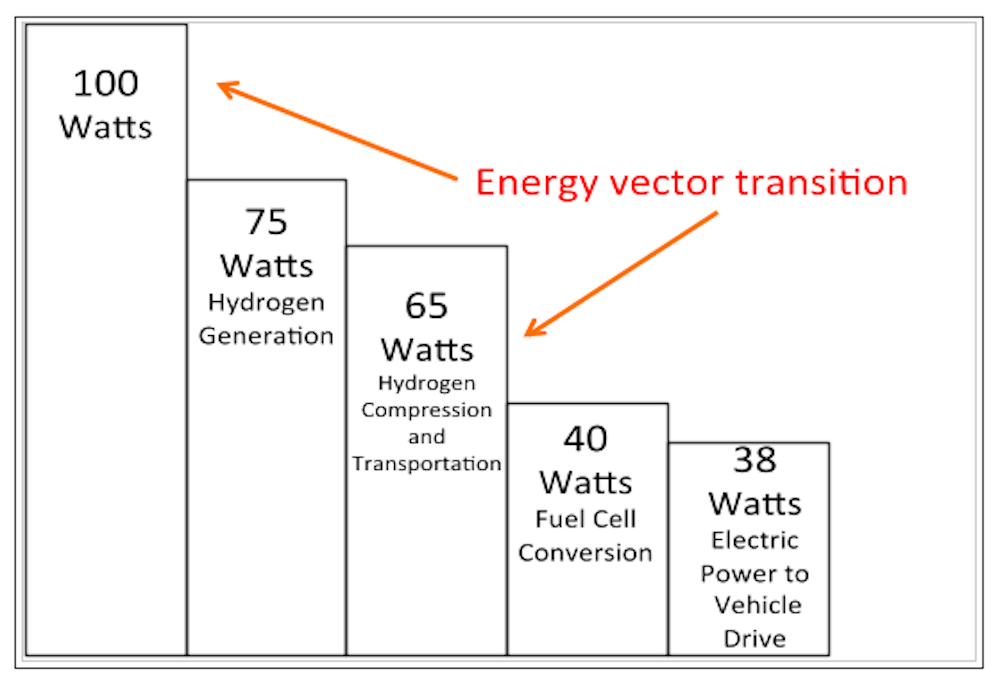And while neither produce the harmful carbon emissions of a petrol or diesel engine they are different. At the moment the only real contender is hydrogen.
 Hydrogen Cars Won T Overtake Electric Vehicles Because They Re Hampered By The Laws Of Science
Hydrogen Cars Won T Overtake Electric Vehicles Because They Re Hampered By The Laws Of Science
Hydrogen technology for powering vehicles offers attractive features and some advantages over electric vehicle technology.

Hydrogen vs electric. When comparing the BEVs with FCVs Volkswagen refers to. Battery Electric Cars Which is Better. Battery-powered electric vehicles BEVs are gradually displacing the internal combustion engine in the move toward greener forms of transportation.
Hydrogen refuel times are much shorter than electrical battery recharge times. Fuel cells generate electricity to drive electric motors with no harmful tailpipe emissions. For each fill of hydrogen the car will gain 320-405km 200-250 miles of range.
Both are propelled by electric motors but where the BEV is powered by a lithium ion battery the FCEV uses a fuel cell to. Then the gas has to be compressed chilled and transported. H 2 O power - H.
The weight of battery driven vehicles reduces the range and is exasperated whenever electric. The foremost reason lies in the fueling source. And it has many benefits.
I think this is one of the biggest things. The fuel cell stack provides electricity consuming hydrogen stored in tanks at high pressure. They produce electricity on the vehicle but with fewer waves.
Hydrogen Fuel Cell vs. An unlimited supply of hydrogen is available. The cars need refuelling but with hydrogen rather than petrol or diesel fuel.
Hydrogen cars it is essential to first understand how each technology works. The difference is that while an EV is powered by a chemical. Both electric and hydrogen cars lack internal combustion engines and run on electricity instead of petrol or diesel.
I would never suggest using a hydrogen car in an urban environment where you need less than 40 kWh. In a comparison of electric cars vs. With a hydrogen fuel cell however you first have to convert the electricity to hydrogen via electrolysis which is only 75 efficient.
In an electric car instead of fuel combusting to provide energy to an engine a lithium-ion battery is used to supply electricity to a motor which then turns the wheels and powers other elements of the car. EVs get theirs from a lithium-ion battery while hydrogen-powered cars are powered by a hydrogen fuel cell that converts hydrogen to electricity while the car is running. I think every technology has a niche or has an application where it can perform best.
Lets take a look at the key differences between electric cars and those powered by hydrogen. With sufficient time and focus on optimizing the total system efficiency these zero. According to the statistics of the US department of energy 95 of hydrogen is produced through the process of methane reforming which is itself quite disturbing for climate change.
It can indeed be inferred that electric vehicles are more sustainable than hydrogen vehicles. It has an electric motor its controllers are similar and it emits the same amount of greenhouse gases none as an electric car. He explains that hydrogen may be better suited to long distance back-to-base transport such as buses and long-haul trucks while electric vehicles are a good solution for the light passenger.
Electric vehicles would arguably win 3 of those 4 criteria. The weight of the battery in an electric vehicle which weighs several hundred kilogrammes is a clear disadvantage. While electric cars run on batteries hydrogen cars run on fuel cells.
Both hydrogen-powered cars and electric vehicles EVs have motors powered by electricity with the major difference being where that electricity is generated from. By the way hydrogen-electric cars are electric cars. An alternative is the hydrogen vehicle or fuel cell electric vehicle FCEV.
Although the range is slightly better for hydrogen cars the performance availability of refueling stations and the price will definitely have to go the electric cars way. For many manufacturers hydrogen isnt seen as a replacement for electric cars but rather another choice for consumers. It is important to note that from the information that has been compiled to date hydrogen fuel cell vehicles have far more efficiency losses than battery electric vehicles and cost more to fill up than current petrol vehicles also being several years behind battery electric vehicles in terms of innovation.
In electrolysis an electric current applied to water breaks the water molecules apart and generates hydrogen and oxygen gases.









